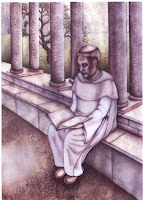
A columnist in a recent article in a Catholic newspaper referred to this accident as an example of what greed can do to any of us at any time. He described how upset he was at the skaters for ruining the opportunity Korea had to sweep all medals in that particular event. He admitted to feeling greatly upset and cheated by the accident and the failure of the skaters to sweep the medals.
He mentioned this to a friend on the day of the crash. The friend said that God had given him a great topic for meditation. Greed is not a personal problem but a problem that can give pain to others. His friend told him that by meditating on how he felt at the time of the crash, it was useful in revealing habitual attitudinal patterns of behavior in his own life.
He soon realized he was upset at the players for not bringing glory to Korea. It was a manifestation of his own greediness--wanting, in this case, an all-Korean sweep of the medals. His friend's "spiritual take" on the event made him rethink his way of responding to things in the world over which he had no control. As he thought about his unjustified anger at the skaters, he was overcome by a feeling of embarrassment.
How we react to anything in life will often depend not on what is being reacted to but on who is doing the reacting. People see the same event and the responses can be quite different. It depends on the way we have in the past reacted to similar events in our life that will influence how we will react to them in the present. When things don't go the way we want, we don't have to respond with complaints, irritation and anger, spreading discontent to those we are with. We can accept whatever happens, no matter how distasteful, without being upset, knowing that in most cases we could not have made a difference in the outcome.
Koreans did hope that it would be an all Korean victory. Confidence and desire to have the Koreans do well in the Olympics was a feeling shared by many, and the writer's feelings about the accident was undoubtedly shared also by many; it was a natural response to the accident but his friend's words were also proper. What we have done to grow spiritually will tend to appear in all aspects of our daily life, enabling us to see reality more completely. A reality where greed is naturally replaced by a spirit of generosity.





